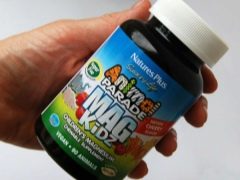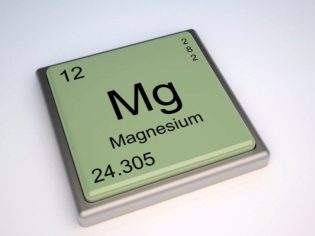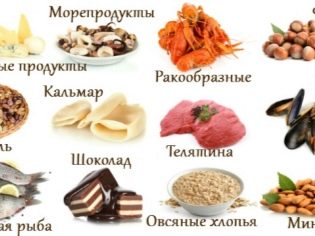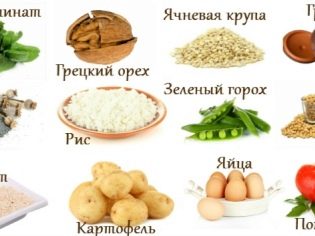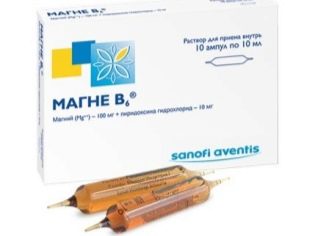Why do children need magnesium and when do they need to take drugs with it?
All women know that magnesium is a must during pregnancy. But few moms understand how great this macroelement is for the body of an already born child. In this article, we will explain in what situations children especially need it, how to determine the state of deficiency of this element in a child, in which products to look for magnesium and what preparations for children exist.
Benefits for children and teenagers
Magnesium is a macro element that is actively involved in a variety of metabolic processes in the human body. It is extremely important for the correct functioning of the nervous system, both in the adult and in the newborn. Without this element it is difficult to imagine the smooth operation of the heart and blood vessels.
It is necessary for digestion, it is necessary for metabolic processes, for the formation of bone tissue, as it improves calcium absorption. The amount of magnesium in the body determines how energetic the child will be, since the macroelement is involved in the production of energy in the splitting of glucose.
If you translate the name of the substance from the Latin, you get the word "great." It is this concept that perfectly characterizes the importance of magnesium for both infants and one-year-old children, and for preschoolers, and especially for adolescents who have entered the age of active puberty.
Any adaptive period (addiction to the world after birth, the beginning of a visit to a kindergarten or school, puberty) is closely associated with stress, which significantly increases the body's need for magnesium.
It improves the transmission of nerve impulses from the brain to the muscle tissue and back, reduces blood pressure and strengthens the vascular walls. Heart rate normalizes. Nervous processes are regulated and become more balanced, due to which hyperactive children become calmer, and inhibited children become more active. In adolescence, the macro element allows the child to maintain a stable emotional background.
Indications for use
It should be noted that supplemental intake of magnesium with food or drugs is necessary for children and adolescents in the event that they have a shortage of this macronutrient. In addition, it is recommended to take it in the following situations:
- the postoperative period;
- the presence of diabetes;
- ailments of the digestive system;
- recovery after treatment with long-term diuretic and laxatives;
- the presence of a child of severe chronic stress, in the period of recovery from a stressful situation, as well as during sudden changes in mood, memory deterioration and performance;
- osteoporosis;
- baldness, hair loss, brittle nails;
- a state of chronic fatigue, for example, when preparing for a competition or for exams;
- severe premenstrual syndrome in adolescent girls, painful menstruation;
- arrhythmia, stenocardia and other heart ailments;
- muscle aches, cramps, cramps;
- sleep disorders, insomnia;
- taking anti-cancer drugs.
In addition, magnesium can be prescribed by a doctor even in conditions of general avitaminosis in children.
Symptoms of deficiency
Guess that the child has a lack of magnesium in the body, the parents can quite independently, but a biochemical blood test, which can be done at any children's clinic, will help to answer this question accurately. The laboratory will determine the content of the substance in the blood, which will enable the doctor to accurately determine whether there is a state of deficiency and how serious it is.
Signs on which it is possible to judge possible shortage of a macrocell, are those:
- the child sleeps a normal amount of time, but does not get enough sleep, feels “overwhelmed”, tired, falls asleep in school, on the way to school or kindergarten;
- the skin of the child becomes dry, the nails break easily, hair fall out, break when combing and just like that. Children with magnesium deficiency often have caries, gum disease;
- a child often has a headache;
- heart rhythm disorders - arrhythmia, tachycardia, bradycardia, both at rest and after physical exertion;
- thermoregulation is disturbed in children - the baby complains about the cold in the heat, the heat. He has cool and slightly wet feet and palms;
- the baby becomes very sensitive to changes in weather conditions. Before the rain or snowfall, he may complain of pain in his legs, arms, and muscles;
- the child shows signs of increased excitability, he often cries, suffers from sudden mood changes, falls into depression for no reason, shows phobias that were not previously observed - he is afraid of darkness, loud sounds, heights and loneliness, etc .;
- the child does not sleep well - cannot sleep, sleeps anxiously, sees nightmares, wakes up in sweat;
- school performance falls, the child remembers the curriculum worse, loses interest in the learning process.
The reasons why a magnesium deficiency develops in a child’s body can be varied. First of all, the shortage threatens children, in the diet of which there are few foods with the content of this macrocell. If the child eats too much protein foods, foods high in calcium, phosphorus, the absorption of magnesium worsens. In a state of stress energy is consumed more, therefore, more substances are needed to replace the body's energy reserves.
Children leading a sedentary lifestyle are more likely to suffer from magnesium deficiency than active and mobile children. And young professional athletes may experience a lack of substance during periods of intense training and excitement before the upcoming important competitions.
If a child often visits a sauna and a bath, if he has just returned from a spa where he was in a hot climate, or lives in a region with a hot climate, he will definitely need an additional intake of magnesium, since these children lack 95% of the time.
Daily dose for children
The daily need for a chemical element is directly dependent on the age of the child. The norm for a newborn and a karapuz up to six months is only 40 mg per day. Children from six months to a year require more energy, they become more mobile and emotional, and therefore they need a dosage of at least 60 mg per day. For children from 1 to 3 years, the rate of consumption per day increases to 80 mg. Preschoolers aged 3-6 years need 120 mg per day. Schoolchildren from 7 to 10 years old - 170 mg per day. At the very beginning of puberty (10-14 years), a child needs at least 270 mg of magnesium per day. At this age, the need for an element is increased. Teenagers from 14 to 18 years old need at least 400 mg per day, but after that the need is reduced. Magnesium is needed to adults to a lesser extent, with the exception of periods of pregnancy and breastfeeding.
In this case (as with most other minerals and vitamins) more is not better. Magnesium overdose is very dangerous, its consequences can be very negative. Laboratory test of blood will help to recognize the excess, as well as the lack. In everyday life, the symptoms of an oversupply are:
- vomiting;
- apathy, depression, depression;
- lethargy;
- diarrhea;
- labored breathing;
- disturbance of heartbeat, slowing heart rhythm.
Products containing an item
In humans, magnesium is not synthesized at all. And because it must be present in the food and beverages that are included in the diet. If there are few such products, then magnesium deficiency is inevitable. Where to look for magnesium? First of all, in products of plant origin. But you should know that when pickling vegetables and herbs, when canning and pasteurizing, the magnesium content, even in a product rich in this element, is reduced by almost 75%.
In order to make the child a correct diet rich in magnesium, it is necessary to include bran in it, the best is rice, in them the content of the macro element is maximum. Also in the menu of the baby and teenager should be present:
- wheat germ;
- soybean;
- buckwheat;
- oat groats;
- rice;
- beans.
Seeds and nuts can also provide a sufficient amount of the element, especially pumpkin seeds, Brazil nuts and hazelnuts. Magnesium is the least in walnuts. Choosing vegetables and fruits, you need to know that where chlorophyll is present, there is always more magnesium in magnesium. And therefore it is necessary to add a large amount of fresh greens to the diet of the child. The leader in the number of elements is watermelon. It is followed by parsley, spinach, dill. A large amount of the substance contained in dried apricots and raisins. But in apples and bananas, contrary to popular belief, this macrocell contains the least.
Good will meet the needs of the body in magnesium products such as:
- crab meat;
- sea kale;
- squid;
- iwashi herring;
- cheese Tofu
There is little magnesium in milk and dairy products, so there is no point in increasing their consumption in the hope of replenishing magnesium deficiency. But a great helper in this situation will be enriched mineral water marked on the label with an increased concentration of magnesium.
Preparations
Depending on the dosage and purpose of magnesium on the shelves of pharmacies can be presented in various forms:
- magnesium citrate and malate help in solving problems at the cellular level, with metabolic disorders, to improve and replenish the body's energy reserves;
- magnesium oxide is used to solve delicate problems with constipation and intestinal symptoms;
- magnesium asparaginate is needed to improve nitrogen metabolism in the body;
- magnesium orotate is needed for cell growth;
- Lactate and magnesium sulfate are necessary in situations where you need to normalize the work of the heart and intestines.
Preparations are produced in ampoules for injections, in tablets, in the form of powders for the preparation of the so-called liquid magnesium - solution for oral administration. If the child is shown a long reception, then usually prescribed pills. If you need to quickly normalize an emergency condition, the drug is administered intravenously or intramuscularly. For treating digestive system problems, powders are preferred. But the specific drug, its form (sulfate, citrate or other), the dosage and frequency of administration must be prescribed by the doctor.
Spontaneous magnesium therapy is strictly prohibited.
As for magnesium preparations, the following are considered the best today.
- Magvit - is a capsule, the active component of which is magnesium citrate. Content of substance - 350 mg. This means that this form is not suitable for babies, but for adolescents it will be quite acceptable (see the daily need for ages above).
- "Doppelgerts Active" - This is a whole line of German drugs such as dietary supplements, which include magnesium. There is a drug with potassium and calcium, with omega-3, with vitamin B6. Content of substance - 400 mg.
- "Panangin Forte" - the drug of potassium and magnesium, produced in tablets. The magnesium content in this “duet” is 280 mg (form - asparaginat).There is also a solution for injections "Panangin" and tablets with the same name. Content of substance in them - 140 mg.
- Magnelis B6-forte - the drug in tablets with a high content of macronutrient - 470 mg. The substance form is lactate. The tool is recommended for children from 6 years.
- Kudesang - means in drops and tablets. Additionally, coenzyme Q10 and vitamin E are added to the composition. Drops are recommended for the youngest patients, and tablets are recommended for teenagers from 12 years old. The active ingredient is presented in the form of asparaginate, the content - 300 mg.
- «Aspark» - This is a combination tool containing magnesium and potassium. The drug is used even for infants, if the doctor believes that the child has a clear magnesium or potassium deficiency. The form of the active substance - asparaginat. Magnesium content - 175 mg.
- "Magnesium B6" - This is one of the most popular and well-known drugs. Available in both liquid and solid form. The solution is added to the drink in the dosage recommended by the doctor. Older children can take the drug in pills. Also widely used is a remedy in the form of a sweet and tasty gel, which children eat with pleasure.
- Magnerot - orotat magnesium. Available in the form of tablets of 500 mg. The drug is usually recommended for adolescents during puberty.
In addition, there are still many less well-known, but no less effective means, which include a macro element, for example, Magnesium Plus, Magnesium Diasporal, Solgar Calcium, Arneby Magnesium, etc. Also, the substance is contained in all children's vitamins, dairy adapted formulas for baby food. To find out whether this content corresponds to the daily needs of a child of a certain age, it is necessary to examine the composition of the drug.
Instructions for use for each specified tool contains comprehensive information on the composition, dosage, form of the active substance and age restrictions.
Contraindications
Do not consider magnesium harmless. This is only "ascorbic" can be given to the child "in passing", just like that. All preparations containing this macrocell have a rather large list of contraindications, and this is another argument in favor of compulsory consultation with a doctor before taking.
Do not take magnesium with:
- phenylketonuria;
- individual intolerance;
- renal failure;
- conditions associated with dehydration (for example, with prolonged diarrhea or after repeated vomiting);
- intestinal obstruction;
- the appearance of blood in the feces, the development of intestinal bleeding;
- excessive sweating;
- rare pulse.
Special recommendations
The best combination is considered to be the combination of magnesium with vitamin B6. It provides the maximum effect, because the macro element is better absorbed. If a child takes iron supplements (for anemia, for example), and also calcium supplements separately, then magnesium will be absorbed much worse. Therefore, it is necessary to take magnesium only 3 hours after taking the funds with calcium or iron. You should not take drugs on an empty stomach, as well as drink with anything other than regular drinking water.
Opinion of Dr. Komarovsky
Famous pediatrician Yevgeny Komarovsky warns parents against the uncontrolled use of magnesium preparations. He considers such tools useful primarily in the absence of a macro element in the children's body. If the deficit is not revealed by the method of examining the child and taking blood from him for biochemical research, then no preparation will make the child’s sleep more sound, and the behavior more calm. The cause of anxiety, insomnia, constipation should be sought in something else and treated with other means and drugs.
Preventive magnesium intake also does not seem to be logical and reasonable for Komarovsky.
If a child gets enough of this substance with food, there is no reason to load his liver and stomach with tablets or solutions, and there may be an overabundance.
Reviews
According to moms, quite often doctors prescribe magnesium without preliminary tests simply on the basis of parents' complaints. If this happens, it is necessary to clarify with the pediatrician, whether he is sure that the child has a deficiency of this macro element.
Many mothers say that children become more sleepy, there are also cases of allergies.
In the next video, Dr. Komarovsky will talk about which vitamins are best given to a child (and should it be done at all).
